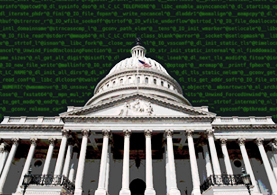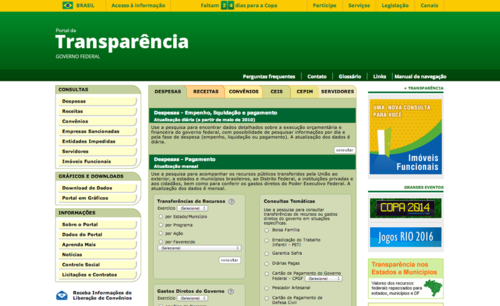This post is by Daniel Schuman, Policy Director of Citizens for Responsibility and Ethics in Washington.
Earlier today, the House of Representatives’ Appropriations Committee made a major move towards improving public access to legislative information. In layman’s terms, the committee said that by the beginning of the next Congress information about the disposition of bills—where they are in the legislative process and who authored or co-sponsored the legislation—will be published in a way that computers can easily process, and thus can be easily reused by apps and websites.

Americans access legislative information through third-party sites. This change in publication policy will help guarantee that accurate, timely, and complete legislative information is directly available from the official source. Congress already publishes the text of legislation in a structured format that is downloadable in bulk.
The committee specifically directed the Clerk of the House to work with the Librarian of Congress and the Public Printer to publish bill status information for bulk data downloads by the beginning of the next congress. This has been a long-standing request of the public interest community and was the subject of a recent letter sent by CREW and GovTrack.us on behalf of the newly formed Congressional Data Coalition.
The report language came at the behest of Rep. Mike Quigley (D-IL), who recommended the committee adopt this language in its report. His recommendation was the culmination of many years of hard work by legislative transparency advocates in both parties, including (but not limited to) Speaker John Boehner (R-OH), Majority Leader Eric Cantor (R-VA), Minority Leader Steny Hoyer (D-MD), and Reps. Darrell Issa (R-CA), Mike Quigley (D-IL), Mike Honda (D-CA), and Ander Crenshaw (R-FL).
In June 2012, Speaker Boehner, Majority Leader Cantor, and then-Legislative Branch Appropriations Subcommittee Chairman Ander Crenshaw issued a letter on the occasion of the establishment of a Legislative Bulk Data Task Force charged with looking into improved public access to legislative information, stating “our goal is to provide bulk access to legislative information the American people without further delay.” Rep. Issa had offered an amendment to put that requirement into law, but withdrew it pending the report of the Task Force. In its December 2013 report, the Task Force recommended "that it be a priority for Legislative Branch agencies to publish legislative information in XML and provide bulk access to that data.“ While the issue was not raised during the recent Legislative Branch Appropriations Subcommittee hearings, Ranking Member Debbie Wasserman-Schultz (D-FL) singled out Rep. Quigley at the full committee hearing for making the recommendation.
With the report language in the final committee report, it is unclear what additional action, if any, is necessary to put it into effect. The House Appropriations Committee has tremendous sway over legislative branch agencies, who may spring to comply even in the absence of floor action in the House. The Senate, in its own committee report, may not address the issue (thus perhaps giving tacit approval) or may expressly agree or disagree to bulk publication of bill status information. Indeed, the Senate’s Legislative Branch Appropriations Subcommittee is still reviewing its appropriation bill, having met just yesterday.
Regardless, today’s action in the House is a significant win for transparency. Public interest advocateshave been fighting for bulk access to legislative information at least since May 2007, and the House has now put its full weight on the side of legislative transparency.
Here is the report language:
The Committee request that the Clerk of the House, the Librarian of Congress and the Public Printer work together to make available to the public through Congress.gov or FDsys bulk data downloads of bill status by the beginning of the next Congress.

